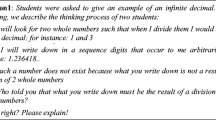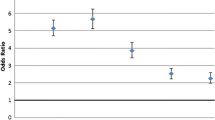Abstract
This report focuses on prospective secondary mathematics teachers’ understanding of irrational numbers. Various dimensions of participants’ knowledge regarding the relation between the two sets, rational and irrational, are examined. Three issues are addressed: richness and density of numbers, the fitting of rational and irrational numbers on the real number line, and operations amongst the elements of the two sets. The results indicate that there are inconsistencies between participants’ intuitions and their formal and algorithmic knowledge. Explanations used by the vast majority of participants relied primarily on considering the infinite non-repeating decimal representations of irrationals, which provided a limited access to issues mentioned above.
Similar content being viewed by others
References
Arcavi, A., Bruckheimer, M. and Ben-Zvi, R.: 1987, ‘History of mathematics for teachers: The case of irrational numbers’, For the Learning of Mathematics 7(2), 18–23.
Dubinsky, E.: 1991, ‘Reflective abstraction in advanced mathematical thinking’, in D. Tall (ed.), Advanced Mathematical Thinking, Kluwer Academic Publishers, Boston, MA, pp. 95–123.
Fischbein, E.: 1987, Intuition in Science and Mathematics: An Educational Approach, D. Reidel, Dordrecht, The Netherlands.
Fischbein, E., Jehiam, R. and Cohen, C.: 1995, ‘The concept of irrational number in high-school students and prospective teachers’, Educational Studies in Mathematics 29, 29–44.
Ginsburg, H.P.: 1981, ‘The clinical interview in psychological research on mathematical thinking: Aims, rationales, techniques’, For the Learning of Mathematics 1(3), 4–11.
Herscovics, N.: 1989, ‘Cognitive obstacles encountered in the learning of Algebra’, in C. Kieran and S. Wagner (eds.), Research Issues in the Learning and Teaching of Algebra, Lawrence Erlbaum, Hillsdale, NJ.
Peled, I. and Hershkovitz, S.: 1999, ‘Difficulties in knowledge integration: Revisiting Zeno’s paradox with irrational numbers’, International Journal of Mathematical Education in Science and Technology 30(1), 39–46.
Sierpinska, A.: 1994, Understanding in Mathematics, Falmer Press, London.
Sfard, A.: 1991, ‘On the dual nature of mathematical conceptions: Reflections on processes and objects as different sides of the same coin’, Educational Studies in Mathematics 22, 1–36.
Tall, D.O.: 2001, ‘Natural and formal infinities’, Educational Studies in Mathematics 48(2-3), 199–238.
Tirosh, D., Fischbein, E., Graeber, A. and Wilson, J.: 1998, ‘Prospective elementary teachers’ conceptions of rational numbers’, Retrieved June 5th, 2003 from the World Wide Web: http://jwilson.coe.uga.edu/Texts.Folder/Tirosh/Pros.El.Tchrs.html.
Zazkis, R. and Hazzan, O.: 1998, ‘Interviewing in mathematics education research: Choosing the questions’, Journal of Mathematical Behavior 17(4), 429–239.
Zazkis, R. and Sirotic, N.: 2004, ‘Making sense of irrational numbers: Focusing on representation’, in M.J. Hoines and A.B. Fuglestad (eds.), Proceedings of 28th International Conference for Psychology of Mathematics Education, Bergen, Norway, Vol. 4, pp. 497–505.
Zazkis, R.: 2005, ‘Representing numbers: Prime and irrational’, International Journal of Mathematical Education in Science and Technology 36(2–3), 207–218.
Author information
Authors and Affiliations
Corresponding author
Rights and permissions
About this article
Cite this article
Sirotic, N., Zazkis, A. Irrational Numbers: The Gap between Formal and Intuitive Knowledge. Educ Stud Math 65, 49–76 (2007). https://doi.org/10.1007/s10649-006-9041-5
Received:
Accepted:
Published:
Issue Date:
DOI: https://doi.org/10.1007/s10649-006-9041-5




